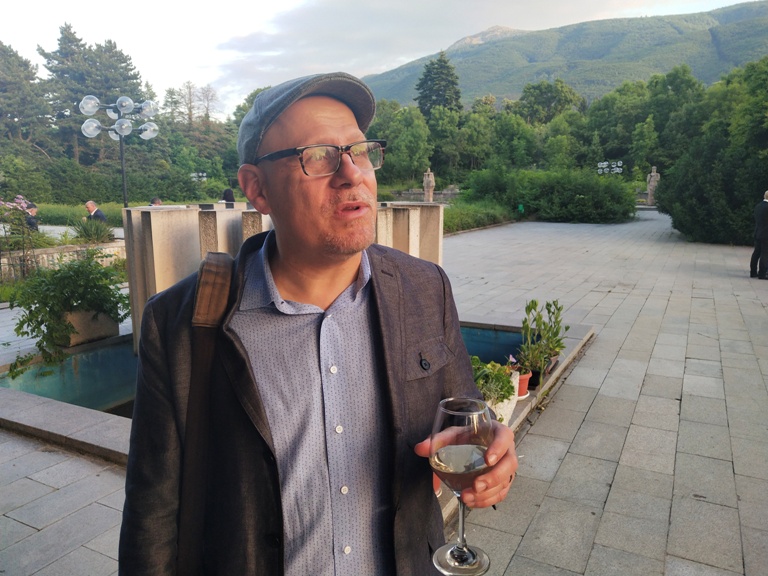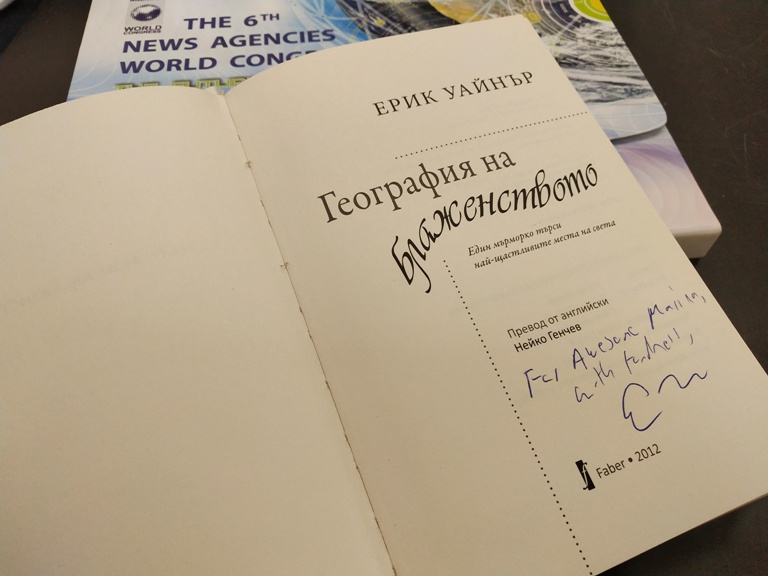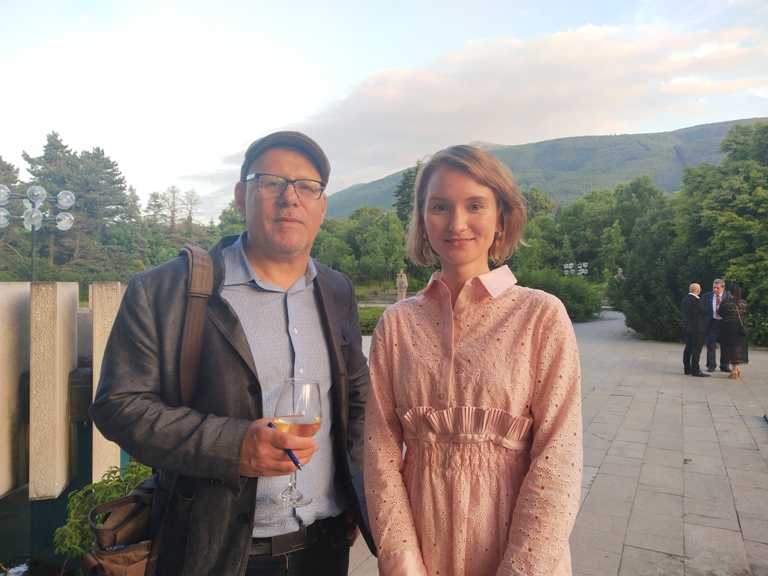Eric Weiner, the former fulltime correspondent of New York Times and NPR, the author of bestseller The Geography of Bliss, Man Seeks God, and the recent The Geography of Genius, whose books have been translated into more than 20 languages, told Vestnik Kavkaza at the 6th News Agencies World Congress in Sofia about his travelling, life philosophy, and modern jopurnalism.
- How many countries have you already visited?
- I’m not a country counter. I always say it’s better to travel well than be well-travelled. I mean that it is not how many countries you have been to – I have been to about 60 countries – but it is more what you see there. I believe in slow travel. You go some place and you spend a long time there – a month or two months, you don’t just fly through. That’s my philosophy.
- Have you been to Caucasus?
- No, but there are many places I’ve not been to. I’ve heard very good things about Georgia. And I think I must go to Georgia. Wine was invented in Georgia they say. There are still a lot of places I haven’t been to. I really love Asian countries. Asia is what a lot of my focus has been. It’s a big world. It takes several lifetimes to see all of it.

- What about Central Asia?
- I visited Kazakhstan, Kyrgyzstan. I liked Kazakhstan. I should say that my daughter was adopted from Kazakhstan. So I went there and I spent a long time in there. We’ve been back recently. So I have a special place in my heart for Kazakhstan. It’s close to Russia too. It’s close geographically and it’s close intellectually. And still a lot of Russian people are living in Kazakhstan of course. Kazakhstan is beautiful. It has open spaces. I’ve been thinking that we don’t have enough space in our life right now with iPhones, with information, with everything in crowded cities. In English, they call it “the steppe.” It’s an unusual word but it means a big open space of Kazakhstan. Like where Baikonur, the Russian space program, is. That is on an open space. You go out there and it is so wide-open. And I feel that that’s missing from our life – space on the ground and in the air.
- Have you been to Turkey or Iran?
- I’ve been to both Turkey and Iran several times and Iraq and Afghanistan. I used to be a war correspondent for American radio network. I’m done with all that. I’m done with war. I don’t write about wars anymore. I write about good things in life, happiness, genius, spirituality. A new book which will be published next year is about wisdom. I’m really looking at the positive side of life.

- Genius is the main topic of your lattest book. Why?
- The latest book is “The Geography of Genius”, it is published in Russian. It was fun. It is about what makes these, I call them genius clusters, these places around the world where you see a lot of geniuses. I want to apologize to Russian readers right now that I did not but I could have written about St. Petersburg or some place in Russia. You have Tolstoy, Dostoyevsky, and so on. But I couldn’t find one center. Tolstoy lived in countryside. So I was looking for cities that had produced a lot of geniuses like Athens, Florence, even Silicon Valley today. So it’s about the relationship between a place and a genius. Why is that geniuses appeared in certain places? What is it in the air, what’s in the water or wine that made it special? So I explore that. I travelled to all these places. But it’s a little more historical looking at the history. I feel bad that I didn’t write about Russia. I should have because you’ve produced so many geniuses.
- Tell me about your future book?
- The book I just sent to my publisher, the manuscript will be published next year, it is called “The Socrates Express”. And it’s about wisdom. It’s about philosophy but philosophy that is practical, that you can use to make yourself happier, healthier and even wealthier. It’s a very practical look at 14 philosophers. And I took a train as much as possible around the world because trains are slow. And one thing I believe is that we need to slowdown. Trains are good for thinking. It will be published next year and I hope in Russian.
- You said at the congress that there is no absolute objectivity. Why do you think so?
- I think it’s really a mistake to talk about objectivity. Objective means a sort of like you a machine, a robot that you don’t have any emotions, background. You’re a Russian, I’m an American, we grew up in different places – we’ve come from different backgrounds. And you report on some events differently from me. We are not objective. We have subjectivity. Happiness is subjective, our life is subjective. But can you be fair? That’s the difference. Fair means that you recognize your subjectivity that you have a bias, you have a background and you look at the other side fairly. To be completely objective is a mistake because then you’ll be accused of fake news if you get one fact wrong or if you see things differently. Fairness is harder to define but I think it’s very important. I think objectivity is a kind of false goal and if you said that it’s the standard journalists will always come up short because journalists have different backgrounds. Let’s not hide from that.

- How does your profession of a journalist influence your life, your interests, your views? Can you split between you as a person and you as a journalist?
- That’s a good question. I don’t think of myself as a journalist anymore. I think of myself as a writer who uses journalistic techniques. When I was a fulltime journalist for New York Times and then for NPR, American radio, I would conduct interviews. So I would interview you. I wanted something from Marina to be honest. I would have my microphone and I would ask you something about politics, economy or Russia. And when I had what I wanted I would be done with Marina. Now I think a bit more that I talk to people, I have conversations to people. I don’t even use the word ‘interview’ because it’s transactional meaning that it’s a transaction like business relationship almost, you have something I want, I’ve something you want and there’s exchange. Now I try to have conversations with people. I used to have a separation between journalistic Eric and human Eric. And I try as much now in my work to have no separation. Who I am and what I do is the same thing. I’m curious about the world, I’m curious about people around the world, I’m curious about big questions – I don’t separate. And I think it’s a better way to live. If you’re a scientist or a teacher or a journalist you want to be integrated, you want have an integrated existence so that you’re not three different selves, you’re just one self. That’s my goal. I don’t always live up to it but that’s what I try to be. We haven’t done an interview now, we have done a conversation.










